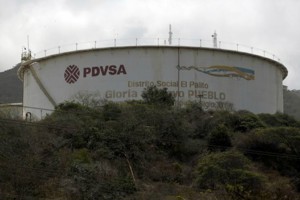Venezuela says considering options to repay debts
VIENNA (Reuters) — Venezuela is considering several options to repay its debts, the oil minister said on Thursday, after a deep recession and low crude prices hit output and prompted Caracas to seek funds from China and Russia.
Venezuelan oil production has slipped to its lowest levels in about 20 years, hurting a nation which relies almost solely on crude exports for revenues.
Oil minister Nelson Martinez, speaking at a meeting of the Organization of the Petroleum Exporting Countries, said his country was producing up to 1.97 MMbpd of oil, citing figures gathered by secondary sources and used by OPEC.
As well as using revenues to pay foreign oil firms operating in Venezuela, Caracas needs to repay debts to China and Russia, which have together lent at least $50 B in exchange for promised oil and fuel deliveries.
"We are looking forward to solving the issue of the debt," Martinez said. "We are looking at all options, some financial support through bonds and so on."
According to Thomson Reuters IFR, Venezuela has $66.28 B in outstanding debt issued by the government and other state entities such as oil company PDVSA, which has been particularly hard-hit by the economic crisis.
In the past few weeks, thousands of people have protested against the leftist government of President Nicolas Maduro, demanding elections, freedom for jailed activists, foreign aid and autonomy for the opposition-led legislature.
A Reuters poll forecast the economy would shrink 3.5% this year after a 19% drop last year. Inflation has hit triple digits, creating food shortages.
Venezuela has been seeking help from Russian oil major Rosneft to pay its debts. As collateral for prepayment on oil deliveries, Rosneft said last week it had received a stake in PDVSA's US refining and marketing arm Citgo.
"What has been done is to use that (collateral) as a pledge for a loan that came from Rosneft. It doesn't mean that Rosneft is going to have 49%," Martinez said, adding that talks with the Rosneft were continuing.
Reporting by Ernest Scheyder; Writing by Amanda Cooper; Editing by Jane Merriman and Edmund Blair







Comments